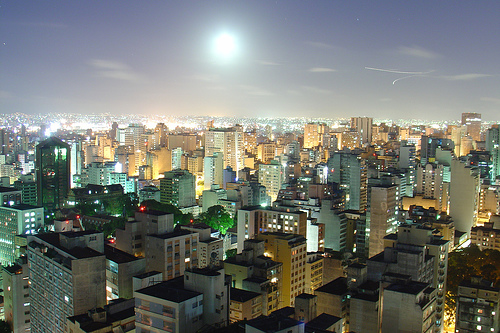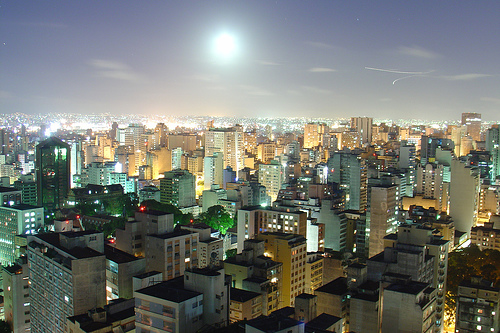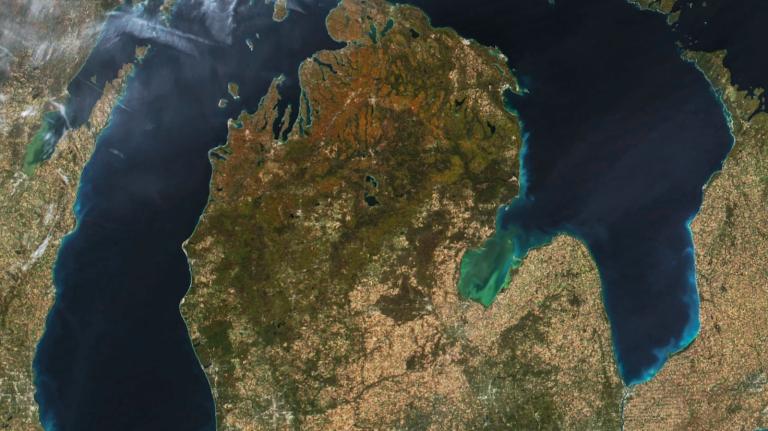 The megacity of Sao Paulo, Brazil.Photo: Luiz Henrique Varga AssuncaoCross-posted from ThinkProgress.
The megacity of Sao Paulo, Brazil.Photo: Luiz Henrique Varga AssuncaoCross-posted from ThinkProgress.
Leaders of the world’s megacities are meeting in Sao Paulo this week for a major climate summit, the fourth meeting of the C40 Climate Leadership Group. From Michael Bloomberg of New York City to Kuma Demeksa of Addis Ababa, Ethiopia, the mayors and top deputies attending represent 297 million people — 4 percent of the world’s population, 10 percent of global greenhouse pollution, and 18 percent of global economic output.
In 2005, the former mayor of London, Ken Livingston, founded the C20, comprised of 20 of the largest multimillion-person cities in the world. He recognized that where national governments were not doing enough, cities could do a lot more, especially the mayors of large cities who have statutory powers outside of national government. As the group has met — 2005 in London, 2007 in New York City, 2009 in Seoul, and now in Sao Paulo — the group has grown into the C40, with affiliated cities like Portland that are climate leaders.
In an exclusive interview with ThinkProgress Green, the manager of the C40 Climate Leadership Group, Simon Reddy, explained how the group works together:
All cities are different, but a lot of the solutions and the problems are similar. There isn’t one large city in the world that doesn’t have traffic problems, that couldn’t be more efficient in its use of electricity, that isn’t trying to improve its waste systems. The leaders come together to share ideas on waste, bus transit systems, travel demand management.
The amount of practical decision-making power that these mega-mayors have over energy, waste, and transit can be immense. There are usually a huge number of public buildings, bus systems, and train systems and an independent city budget. London has introduced congestion pricing to reduce vehicular traffic and pollution. Tokyo has introduced policies on energy, waste, and transit. Sao Paulo is one of the leading cities to use landfill-gas capture and energy generation.
In the six years of this global mayoral initiative, 4,700 climate-related actions have been placed into effect in the C40 cities where they have statutory control, Reddy said. Adaptation is an important component, with many of the cities already having to deal with the effects of global warming, including heatwaves, flooding, and landslides.
The host city Sao Paulo is a perfect example of the peril and promise of dealing with our polluted climate. The city has a population of over 18 million people, spread out over an 80-mile-wide circle. The city has deep poverty and serious crime, with large areas of illegal slums and shanty towns known as favelas. The city is burdened by extreme traffic issues, and suffers from flash flooding that doesn’t drain well. At the same time, Sao Paulo’s landfill system generates 7 percent of its electricity. There are over 70 miles of bus rapid transit and 60 miles on bicycles lanes serving 25,000 people a day. Like the rest of the Brazil, Sao Paulo uses sugarcane ethanol. The city is increasing energy efficiency in buildings and lighting.
“All cities are facing the squeeze,” Reddy said, when asked about the austerity budgets and economic challenges of our current time. But a lot of the initiatives being pursued by the C40 reduce greenhouse-gas emissions by making systems more efficient. “They’re good for the city, for the building, good for the climate.” Reddy emphasized that cutting back on clean energy to protect short-term budgets would be a dangerously foolish choice:
Action now on climate change will save a lot more money than if we wait till later. The costs are astronomical if you don’t prepare now. The cost of large-scale flooding, of traffic systems that don’t work, landslides. It’s worth investing.
The mayors are also trying to tackle one of the most politically difficult challenges in the climate fight — bridging the divide of the rich and poor. The opportunities for investment in a city like London or Amsterdam are very different from Jakarta, Indonesia, and Changwon, South Korea. The group is trying to establish a carbon finance capacity building program, working to help developing cities be eligible for the United Nations Clean Development Mechanism funding program. World Bank President Roger Zoellick, who is attending the summit, has been working with C40 and is expected to announce positive developments.
Reddy told ThinkProgress he was surprised by the willingness of the cities to participate in the climate fight. “There’s a lot of enthusiasm of the mayors to make sure our cities are prepared for the climatic impacts that we are starting to see now,” he said. “It’s refreshing to see this city approach to climate action being successful in going forward when national governments are fighting among themselves.”




